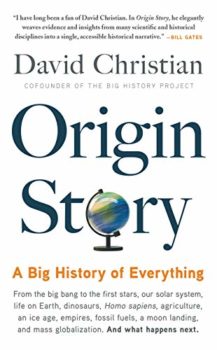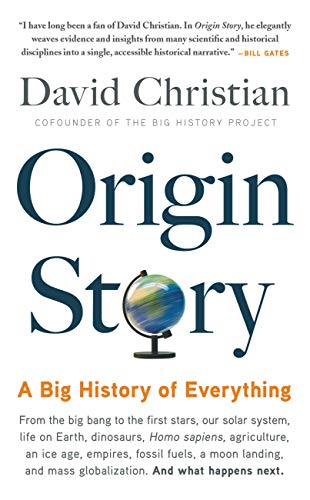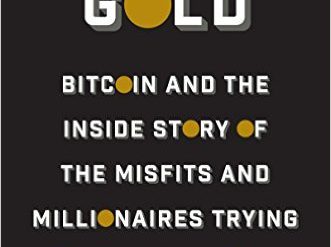
Origin Story is historian David Christian’s valiant effort to cram the history of the universe into 300 pages.
Historians typically trace the beginning of human history to the time some 5,000 years ago when people started committing language to writing. After all, history as practiced in academia is the study of primary and secondary sources, nearly all of them written. And without a written record there is presumably no history. But doesn’t it seem shortsighted to limit ourselves to a mere 5,000 years when the human race has walked the Earth for at least 200,000 years and the planet has been in existence for some 4.5 billion? It’s not as though our only source of information about the past is what has been written. Geology, archaeology, genetics, and climate science can all shed light on the forces that have shaped human affairs. To understand where we’ve come from and how we got here, why should we confine ourselves to the silos of academia?
Estimated reading time: 4 minutes
Origin Story: A Big History of Everything by David Christian (2018) 325 pages ★★★★☆
Origin Story: a comprehensive approach to the study of the past
That was the question historian David Christian asked himself thirty years ago. An Oxford-educated American then teaching in Australia, Christian developed a course he called “Big History.” He enlisted the help of colleagues in other departments to employ the full range of academic tools in exploring the past. In fact, he began at the very beginning, with the Big Bang. With help from astrophysicists, chemists, exobiologists, and other scientists and social scientists, Christian surveyed the full 13.8 billion years in the history of the universe, with a focus on humankind’s place in this much wider context. And today, he is recognized as the creator of the emerging field of Big History, an interdisciplinary field that has given rise to the International Big History Association and the Journal of Big History.
“An origin story for all modern humans”
In Origin Story, Christian’s most recent book in the field, he shoehorns into barely more than 300 pages a survey of Big History. As he notes in an Introduction, “This is an origin story for all modern humans, and it builds on the global traditions of modern science.” The first half of the book encompasses the Big Bang, the formation of stars and galaxies, the creation of the solar system, and the emergence of life on Earth. The human race appears between 200,000 and 300,000 years ago, midway through the book.
The eight thresholds of Big History
Christian finds all 13.8 billion years of Big History marked by eight Threshholds:
- Threshold 1: The Big Bang
- Threshold 2: The creation of stars and galaxies
- Threshold 3: The Periodic Table expands
- Threshold 4: Molecules, moons, planets, and solar systems emerge
- Threshold 5: Simple life first appears on Earth
- Threshold 6: Life grows more complex, and eventually humans first walk the Earth
- Threshold 7: Humans set out on the road to agrarian civilization
- Threshold 8: The Anthropocene: the fossil fuel revolution
As Christian notes, this is a story of ever-growing complexity. At each of these key transition points, “more complex things appeared.” The eight Thresholds “highlight major turning points, when already existing things were rearranged or otherwise altered to create something with new, ’emergent’ properties.”
Christian’s writing is strong and clear. But when explaining in detail what transpired at each of these turning points, he makes liberal use of scientific language. It’s rough going without a solid, college-level grounding in science. But there’s no end of insight in this fresh and provocative approach to the study of the past.
For related reading
This is one of the books I’ve included in my post, Gaining a global perspective on the world around us. And take a look at:
- New perspectives on world history
- 20 top nonfiction books about history
- Science explained in 10 excellent popular books
You might also be interested in 20 most enlightening historical novels.
And you can always find my most popular reviews, and the most recent ones, on the Home Page.


























